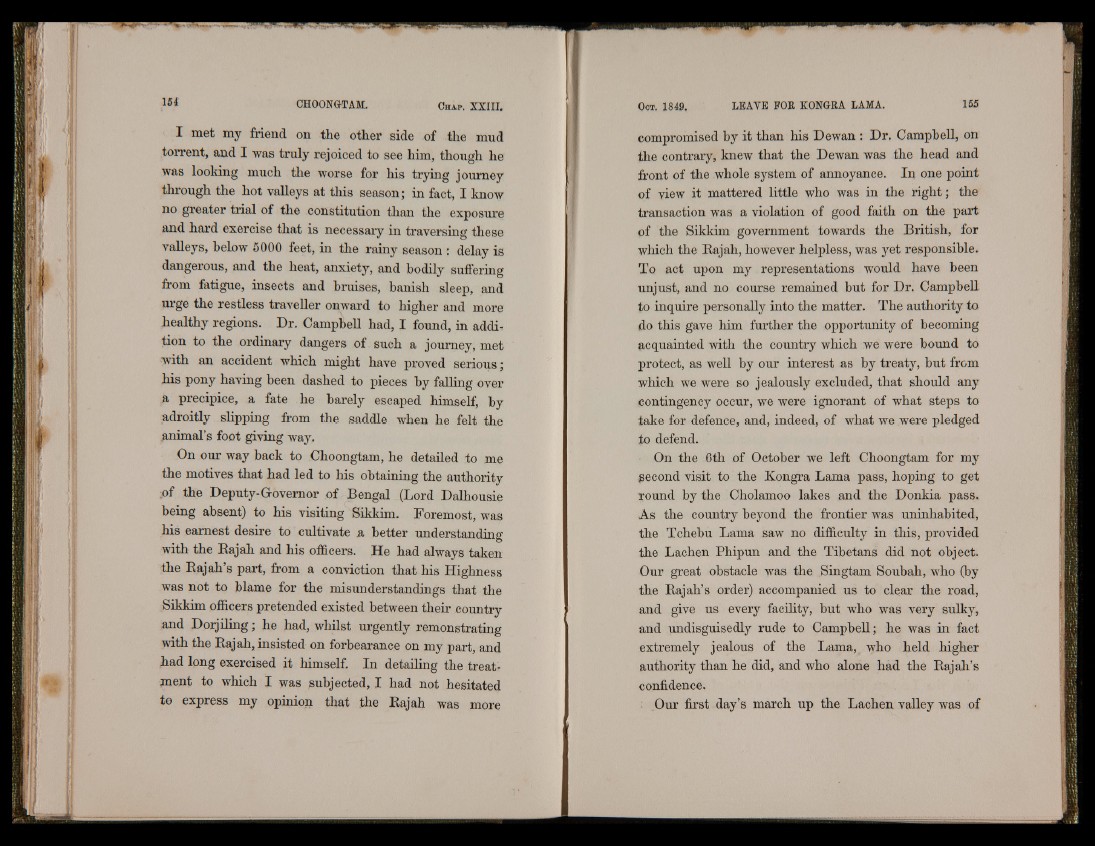
I met my friend on the other side of the mud
torrent, and I was truly rejoiced to see him, though he
was looking much the worse for his trying journey
through the hot valleys at this season; in fact, I know
no greater trial of the constitution than the exposure
and hard exercise that is necessary in traversing these
valleys, below 5000 feet, in the rainy season : delay is
dangerous, and the heat, anxiety, and bodily suffering
from fatigue, insects and bruises, banish sleep, and
urge the restless traveller onward to higher and more
healthy regions. Dr. Campbell had, I found, in addition
to the ordinary dangers of such a journey, met
with an accident which might have proved serious;
his pony having been dashed to pieces by falling over
a precipice, a fate he barely escaped himself, by
adroitly slipping from the saddle when he felt the
animal’s foot giving way.
On our way back to Choongtam, he detailed to me
the motives that had led to his obtaining the authority
of the Deputy-Governor of Bengal (Lord Dalhousie
being absent) to his visiting Sikkim. Foremost, was
his earnest desire to cultivate a better understanding
with the Rajah and his officers. He had always taken
the Rajah’s part, from a conviction that his Highness
was not to blame for the misunderstandings that the
Sikkim officers pretended existed between their country
and Dorjiling; he had, whilst urgently remonstrating
with the Rajah, insisted on forbearance on my part, and
had long exercised it himself. In detailing the treatment
to which I was subjected, I had not hesitated
to express my opinion that the Rajah was more
compromised by it than his Dewan : Dr. Campbell, on
the contrary, knew that the Dewan was the head and
front of the whole system of annoyance. In one point
of view it mattered little who was in the rig h t; the
transaction was a violation of good faith on the part
of the Sikkim government towards the British, for
which the Rajah, however helpless, was yet responsible.
To act upon my representations would have been
unjust, and no course remained but for Dr. Campbell
to inquire personally into the matter. The authority to
do this gave him further the opportunity of becoming
¡acquainted with the country which we were bound to
protect, as well by our interest as by treaty, but from
which we were so jealously excluded, that should any
contingency occur, we were ignorant of what steps to
take for defence, and, indeed, of what we were pledged
to defend.
On the 6th of October we left Choongtam for my
Second visit to the Kongra Lama pass, hoping to get
round by the Cholamoo lakes and the Donkia pass.
As the country beyond the frontier was uninhabited,
the Tchebu Lama saw no difficulty in this, provided
the Lachen Phipun and the Tibetans did not object.
Our great obstacle was the Singtam Soubah, who (by
the Rajah’s order) accompanied us to clear the road,
and give us every facility, but who was very sulky,
and undisguisedly rude to Campbell; he was in fact
extremely jealous of the Lama, who held higher
authority than he did, and who alone had the Rajah’s
confidence.
Our first day’s march up the Lachen valley was of